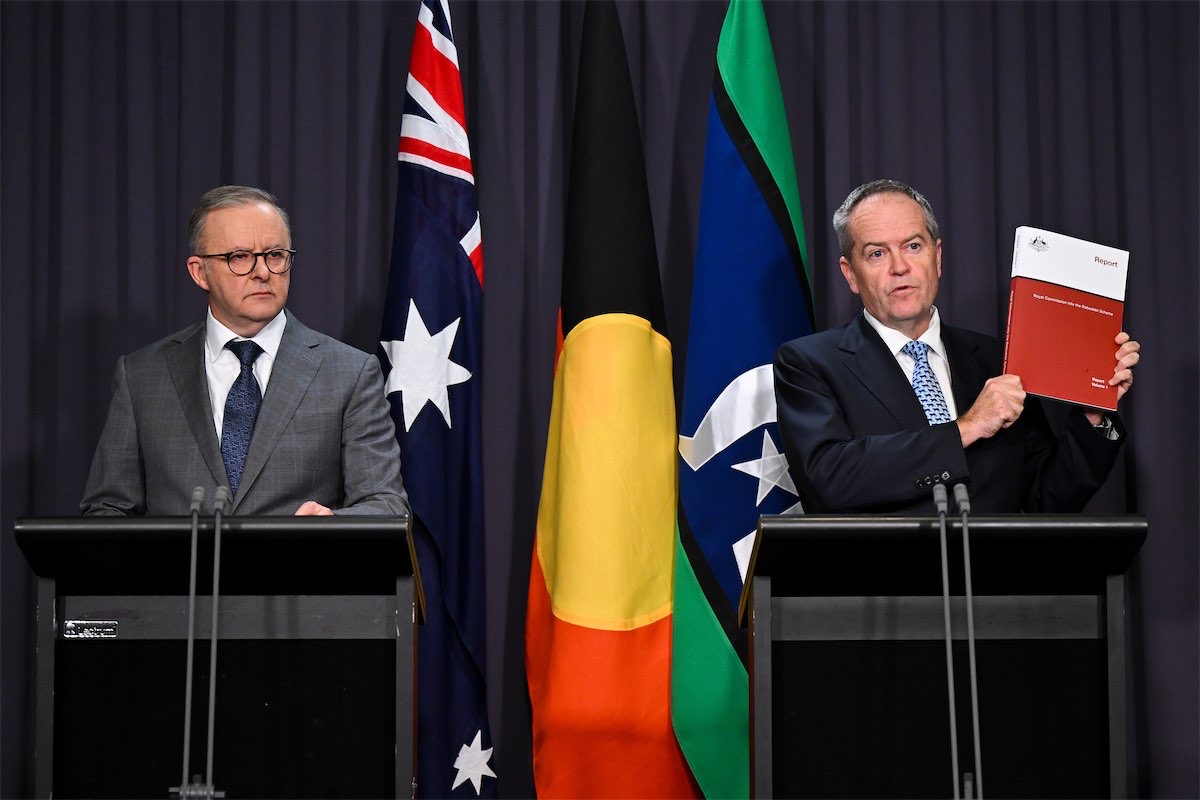
The robodebt royal commissioner makes multiple referrals for prosecution, condemning scheme as ‘crude and cruel’, writes MICHELLE GRATTAN.
ROBODEBT Royal Commissioner Catherine Holmes has referred multiple individuals involved with the illegal scheme for civil and criminal prosecutions and other actions.

But the names remain secret. They are contained in a sealed section of Holmes’ report, released Friday, with referrals variously being made to the Public Service Commission, the new National Anti-Corruption Commission, the Australian Federal Police, and professional bodies.
In a swingeing indictment of the scheme, the commission says: “Robodebt was a crude and cruel mechanism, neither fair nor legal, and it made many people feel like criminals. In essence, people were traumatised on the off-chance they might owe money. It was a costly failure of public administration, in both human and economic terms.”
The commissioner has not made public the names of those in the secret section so as not to prejudice future actions.
Prime Minister Anthony Albanese told a news conference he did not have the sealed section, but the head of his department, Glyn Davis, did.
Robodebt, designed to raise maximum revenue, used income averaging to strike debts to recover money from welfare payments. It unlawfully raised $1.76 billion from hundreds of thousands of welfare recipients, but many of the calculated debts were wrong, and after the illegality of the scheme was exposed the former government had to announce it would repay the money.
Former Liberal ministers come in for trenchant criticism.
Scott Morrison, who as social services minister was an initiator of the scheme, “allowed Cabinet to be misled,” the report says.
“He took the proposal to cabinet without necessary information as to what it actually entailed and without the caveat that it required legislative and policy change,” it says.
“He failed to meet his ministerial responsibility to ensure that Cabinet was properly informed about what the proposal actually entailed and to ensure that it was lawful.”
Morrison said in a statement later: “I reject completely each of the findings which are critical of my involvement in authorising the scheme and are adverse to me. They are wrong, unsubstantiated and contradicted by clear documentary evidence presented to the Commission.”
In a news conference after the report’s release, Albanese said Morrison’s defence of the scheme was, in the wording of the report, based on a “falsehood”.
The report says of the former minister for government services, Stuart Robert, who argued he was obliged to defend the scheme despite his doubts about it: “It can be accepted that the principles of Cabinet solidarity required Mr Robert to publicly support Cabinet decisions, whether he agreed with them or not”.
“But Mr Robert was not expounding any legal position, and he was going well beyond supporting government policy. He was making statements of fact as to the accuracy of debts, citing statistics which he knew could not be right.
“Nothing compels ministers to knowingly make false statements, or statements which they have good reason to suspect are untrue, in the course of publicly supporting any decision or program,” the report says.
“The Guardian” has reported Robert saying: “I have NOT received a notice of inclusion in the ‘sealed section’ and I understand they have all gone out”.
The commissioner says of former human services minister Alan Tudge that his “use of information about social security recipients in the media to distract from and discourage commentary about the scheme’s problems represented an abuse of that power.
“It was all the more reprehensible in view of the power imbalance between the minister and the cohort of people upon whom it would reasonably be expected to have the most impact, many of whom were vulnerable and dependent on the department, and its minister, for their livelihood.”
In a Friday statement Tudge said: “I strongly reject the Commission’s comments of the way I used the media and that I had abused my power in doing so. At no stage did I seek to engage in a media strategy that would discourage legitimate criticism of the scheme.” He said he had not received notification that he was one of those referred in the sealed section of the report.
The report is highly critical of the then-head of the human services department, Kathryn Campbell, finding she stayed silent about the misleading effect of the income averaging proposal, and the advice it needed legislative change, “knowing that [social services minister] Mr Morrison wanted to pursue the proposal and that the government could not achieve the savings which the [scheme] promised without income averaging”.
In her preface to the report, the commissioner says: “It is remarkable how little interest there seems to have been in ensuring the scheme’s legality, how rushed its implementation was, how little thought was given to how it would affect welfare recipients and the lengths to which public servants were prepared to go to oblige ministers on a quest for savings.
“Truly dismaying was the revelation of dishonesty and collusion to prevent the scheme’s lack of legal foundation coming to light.
“Equally disheartening was the ineffectiveness of what one might consider institutional checks and balances – the Commonwealth Ombudsman’s Office, the Office of Legal Services Coordination, the Office of the Australian Information Commissioner and the Administrative Appeals Tribunal – in presenting any hindrance to the Scheme’s continuance.”
She says the sealed section “in part is intended as a means of holding individuals to account, in order to reinforce the importance of public service officers acting with integrity.
“But as to how effective any recommended change can be, I want to make two points.
“First, whether a public service can be developed with sufficient robustness to ensure that something of the like of the Robodebt scheme could not occur again will depend on the will of the government of the day, because culture is set from the top down.
“Second, politicians need to lead a change in social attitudes to people receiving welfare payments.
“The evidence before the Commission was that fraud in the welfare system was minuscule, but that is not the impression one would get from what ministers responsible for social security payments have said over the years.
“Anti-welfare rhetoric is easy populism, useful for campaign purposes. It is not recent, nor is it confined to one side of politics.
“Largely, those attitudes are set by politicians, who need to abandon for good (in every sense) the narrative of taxpayer versus welfare recipient.”
The Minister for Government Services, Bill Shorten, who pursued the Robodebt issue in opposition, said the report showed “the previous government and senior public servants gaslighted the nation and its citizens for four and a half years. They betrayed the trust of the nation and its citizens for four and a half years with an unlawful scheme which the Federal Court has called the worst chapter of public administration.”![]()
Michelle Grattan, Professorial Fellow, University of Canberra. This article is republished from The Conversation.
Who can be trusted?
In a world of spin and confusion, there’s never been a more important time to support independent journalism in Canberra.
If you trust our work online and want to enforce the power of independent voices, I invite you to make a small contribution.
Every dollar of support is invested back into our journalism to help keep citynews.com.au strong and free.
Thank you,
Ian Meikle, editor



![Evie Hudson is a woman with amnesia, who forgets the last 13 years. Piecing her life back together, she navigates the harsh realities of coercive control.
Evie is the leading character in local author @emmagreyauthor's second novel Pictures of You.
Her debut book, The Last Love Note, sold more than 100,000 books worldwide within a few months of being published last year.
“I think that using amnesia really helped [show the effects of coercive control] because she had that sense of being completely lost in her own life,” Emma says of her new work of fiction.
To read the full story and find out more about this fabulous local author and her latest novel, visit our website at citynews.com.au or click the link in our bio! 📚✒️
#canberra #local #canberralocals #canberralife #australia #author #localauthor #Picturesofyou #coercivecontrolisabuse #dvawareness #bestsellingauthor #canberraauthor #localnews #citynews](https://citynews.com.au/wp-content/plugins/instagram-feed/img/placeholder.png)
Leave a Reply